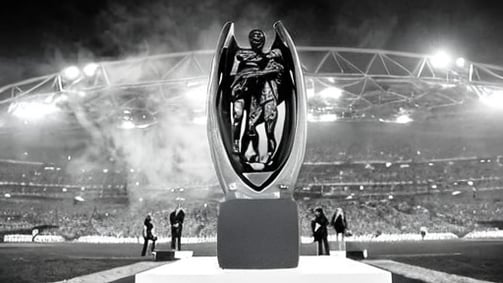Australia's NRL History: Unveiling the Legacy
SPORTS


Immerse yourself in the exhilarating saga of Australia's NRL: a vivid tapestry of historical roots, transformative milestones, and cultural resonance.
The National Rugby League (NRL) represents more than just a sporting competition for Australians; it symbolises unity, excitement, and a rich heritage spanning over a century. To appreciate the intricacies and cultural significance of the NRL, we need to delve into the past, explore its fascinating origins, and observe its evolution over time.
Emergence of Rugby League in Australia
The roots of Rugby in Australia trace back to the late 19th century when British colonists introduced the sport. Over time, the game evolved, and a more player-centric version emerged, referred to as the "Northern Union" code, the precursor to Rugby League, in 1907. This alternative code became popular among players due to its focus on player remuneration, a major issue in the strictly amateur rugby union.
The Birth of NRL
The birth of the NRL was the result of various transformations and a defining conflict in the world of Australian Rugby.
The NSWRL Era
The formation of the New South Wales Rugby League (NSWRL) in 1907 marked a significant milestone in Australian Rugby. The NSWRL provided a professional structure that nurtured several clubs to prominence and laid the foundation for modern-day Rugby League.
The ARL-SL War and Formation of NRL
The 90s were a tumultuous period in Australian Rugby. The infamous Super League war, a tussle between the Australian Rugby League (ARL) and the Rupert Murdoch-backed Super League, fragmented the sport. The resolution of this conflict led to the formation of the National Rugby League in 1998, a unifying entity representing Rugby League in Australia.
Significant Moments in NRL History
The NRL's rich history is studded with triumphant victories, unforgettable moments, and occasional controversies.
The First Grand Final
The first NSWRL grand final took place in 1908, and the South Sydney Rabbitohs secured victory, setting a precedent for their future success. Today, the Rabbitohs remain one of the most successful clubs in the NRL.
Moments of Triumph and Controversy
From breath-taking tries to contentious referee decisions, the NRL has experienced a wealth of defining moments.
The Immortals
The 'Immortals' concept was introduced in 1981 by Rugby League Week magazine to honour the game's greatest players. As of 2022, thirteen players have earned this distinguished title, including legendary figures such as Wally Lewis, Mal Meninga, and Andrew Johns.
Iconic NRL Grand Finals
The grand finals often serve as the stage for the most dramatic moments in the NRL. The 2015 grand final stands as a testament to this, with the North Queensland Cowboys clinching their first-ever NRL title through a thrilling golden point victory, forever etched in the annals of the NRL.
The Evolution of NRL Teams
The composition of teams in the NRL has dramatically evolved over the years.
From Foundation Clubs to Today
The competition began in 1908 with nine foundation clubs. With the growth of the sport, teams folded, new ones emerged, and today, 16 clubs fiercely compete in the NRL each season. This evolution encapsulates the dynamism of the sport.
NRL in the New Millennium
The NRL has continued to modernise and evolve in the 21st century, bringing a host of exciting changes to the game.
The Introduction of Golden Point
The Golden Point rule, introduced in 2003, brought a thrilling dimension to the game. In case of a draw at the end of the regular 80 minutes, extra time is played, with the first team to score securing victory. This rule has given birth to some of the most exhilarating moments in NRL history.
Expansion and Modernisation
The NRL has been proactive in expanding and modernising the sport in the new millennium.
The Impact of the Digital Age
Embracing the digital age, the NRL has innovated its digital strategies to enhance fan engagement. The introduction of the NRL app and the league's bolstered online presence have revolutionised the fan experience, allowing followers of the sport to stay connected no matter where they are.
The Cultural Significance of NRL
Rugby League, embodied by the NRL, is more than a sport; it's a cultural institution in Australia. The sport transcends the boundaries of the playing field, uniting communities, bridging societal divisions, and contributing to the national identity.
Future of NRL
As the NRL looks to the future, the focus is on continuing its legacy of innovation and growth. The prospects of further expansion, including the introduction of more teams and the continual embrace of technology, signify a bright and promising future for the NRL.
Conclusion
From its inception in the early 20th century to its status today as one of the world's premier sporting competitions, the NRL's journey is a fascinating tale of evolution, innovation, and cultural resonance. As we stand on the cusp of another thrilling chapter in its history, one thing is certain: the NRL will continue to captivate the hearts of Australians and fans worldwide, adding more unforgettable moments to its rich tapestry.
FAQs
1. When was the NRL founded?
The NRL was officially founded in 1998, following the resolution of the conflict between the Australian Rugby League (ARL) and the Super League.
2. Who won the first-ever NRL Grand Final?
The first NSWRL grand final in 1908 was won by the South Sydney Rabbitohs, marking the beginning of their illustrious history in the league.
3. How many teams compete in the NRL today?
As of now, the NRL comprises 16 clubs that compete each season.
4. What are 'The Immortals' in NRL?
'The Immortals' is a concept that honours the all-time greatest players in the NRL. As of 2022, thirteen players have been bestowed with this honour.
5. How has the NRL evolved in the 21st century?
The NRL has seen considerable changes since the turn of the millennium, including the introduction of the golden point rule, expansion and modernisation initiatives, and the comprehensive adoption of digital technologies to enhance fan engagement.
